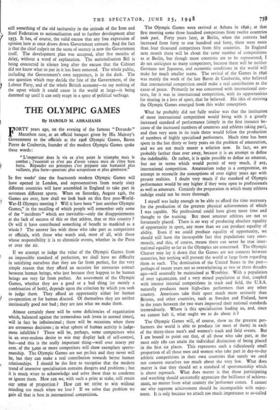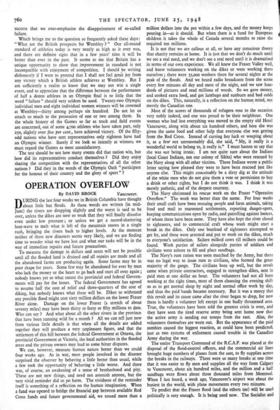THE OLYMPIC GAMES
By HAROLD M. ABRAHAMS
FORTY years ago, on the evening of the famous " Dorando " Marathon race, at an official banquet given by His Majesty's Government to the officials at the 1908 Olympic Games, Baron
Pierre de Coubertin, founder of the modern Olympic Games spoke these words : " L'important dans la vie ce n'est point le triomphe mais le combat ; l'essentiel ce n'est pas d'avoir vaincu mais de s'etre bien battu. Repandre ces preceptes c'est preparer une humanite plus vaillante, plus forte—pourtant plus scrupuleuse et plus genereuse."
In five weeks' time the fourteenth modern Olympic Games will have opened in London, and representatives from nearly sixty different countries will have assembled in England to take part in seventeen different sports. When on Saturday, August 14th, the Games are over, how shall we look back on this first post-World- War-II Olympic meeting ? Will it have been " just another Olympic Games," in the recalling of which people will remember only some of the " incidents " which are inevitable—only the disappointments at the lack of success of this or that athlete, that or this country ? Or will it have contributed something of benefit to mankind as a whole ? The answer lies with those who take part as competitors or officials, with those who watch and, most of all, with those whose responsibility it is to chronicle events, whether in the Press or over the air.
If we attempt to judge the value of the Olympic Games from an impossible standard of perfection, we shall have no difficulty in satisfying ourselves that they are far from perfect, for the very simple reason that they afford an occasion for strenuous contact between human beings, who just because they happen to be human beings are very far from perfect. An assessment of the Olympic Games, whether they are a good or a bad thing (or merely a combination of both), depends upon the criterion by which you seek to judge them. They afford an opportunity either for human co-operation or for human discord. Of themselves they are neither intrinsically good nor bad ; they are just what we make them.
Almost certainly there will be some deficiencies of organisation which, balanced against the tremendous task (even in normal times), will in fact be infinitesimal ; there will be occasions when there are erroneous decisions ; in what sphere of human activity is judge- ment infallible ? There will be, perhaps, some competitors who in an over-zealous desire to win may display lack of self-control, but—and this is the really important thing—well over ninety per cent. of the 3,000 or more competitors will show exemplary sports- manship. The Olympic Games are not perfect and they never will be, but they can make a real contribution towards better human relationships. I should be the first to recognise that the modern
trend of intensive specialisation contains dangers and problems ; but it is much wiser to acknowledge and solve these than to condemn or ignore them. How can we, with such a prize at stake, still retain our sense of proportion ? How can we strive to win without minding too much when we lose ? If we solve that problem we gain all that is best in international competition.
The Olympic Games were revived at Athens in 1896 ; at that first meeting some three hundred competitors from twelve countries took part. Forty years later, at Berlin, when the contests had increased from forty to one hundred and forty, there were more than four thousand competitors from fifty countries. In England next month there will be about the same number of competitions as at Berlin, but though more countries are to be represented, I do not anticipate so many competitors, because there will be neither Germans nor Japanese, and economic conditions in the world will make for much smaller teams. The revival of the Games in 1896 was mainly the work of the late Baron de Coubertin, who believed that international competition could make a real contribution to the cause of peace. Primarily he was concerned with international con- tests, for it was in international competition, with its opportunities for sharing in a love of sport, that he believed. His idea of reviving the Olympic Games emerged from this wider conception.
What he probably did not fully realise was that the institution of more international competition would bring with it a greatly increased standard of performance (simply in the first instance be- cause of the increased numbers of countries and athletes taking part), and then very soon in its train there would follow the production of numbers of highly specialised performers. Much time has been spent in the last thirty or forty years on the problem of amateurism, and we are not much nearer a solution now. In fact, we are probably farther than ever away, because it is an attempt to define the indefinable. Or rather, it is quite possible to define an amateur, but not in terms which would permit of very much, if any, international competition. Amateurism today is a compromise, an attempt to reconcile the conceptions of over eighty years ago with present realities. I doubt very much if the standard of Olympic performance would be any higher if they were open to professionals as well as amateurs. Certainly the preparation in which many athletes indulge could not be more thorough.
I myself was lucky enough to be able to afford the time necessary for the production of the greatest physical achievements of which I was capable. No professional could have given more time and thought to the training. But most amateur athletes are not so fortunately placed. There is no way of producing absolute equality of opportunity in sport, any more than we can produce equality of ability. Even if we could produce equality of opportunity, we should still have the inescapable fact that populations vary enor- mously, and this, of course, means there can never be true inter- national equality so far as the Olympics are concerned. The Olympic Charter may lay it down that the Games are not contests between countries, but nothing will prevent the world at large from regarding them as such. The domination of the United States in the past— perhaps of recent years not so overwhelming as two or three decades ago—will assuredly be maintained at Wembley. With a population of over 140,000,000, and a very mixed population at that, coupled with intense internal competitions in track and field, the U.S.A. naturally produces more high-class performers than any other country. Americans take their sport much more seriously than Britons, and other countries, such as Sweden and Finland, have in the years between the two wars improved their national standards tremendously. Where is this specialisation leading us, and, since we cannot halt it, what ought we to do about it ?
The Olympic Games will, of course, show us the greatest per- formers the world is able to produce (or most of them) in each of the thirty-three men's and women's track and field events. But I am bound to point out that, of all those who take part, at the most only 180 can attain the individual distinction of being placed in the first six places. This represents such a ridiculously small proportion of all those men and women who take part in day-to-day athletic competitions in their own countries that surely we need not concern ourselves too much about the very few. What does matter is that they should set a standard of sportsmanship which is above reproach. What does matter is that those participating and watching should unstintedly appreciate the brilliance of achieve- ment, no matter from what country the 'performer comes. I cannot see why supreme achievement should be incompatible with enjoy- ment. It is only because we attach too much importance to so-called
success that we over-emphasise the disappointment of so-called failure.
Which brings me to the question so frequently asked these days: " What are the British prospects for Wembley ? " Our all-round standard of athletics today is very nearly as high as it ever was, and there are definite signs that in a few years' time it will be better than ever in the past. It seems to me that Britain has a unique opportunity to show that improvement in standard is not incompatible with enjoyment of competition. I should be writing dishonestly if I were to pretend that I shall not feel great joy from any victory which a British athlete achieves at Wembley. But I am sufficiently a realist to know that we may not win a single event, and to appreciate that the difference between the performance of half a dozen athletes in an Olympic final is so little that the word " failure " should very seldom be used. Twenty-two Olympic individual men and eight individual women winners will be crowned at Wembley—thirty among perhaps six hundred. Do not let us attach so much to the possession of one or two among them. In the whole history of the Games so far as track and field events are concerned, out of some 4,700 athletes who have taken part, only 250, slightly over five per cent., have achieved victory. Of the fifty- odd nations who have sent representatives only eighteen have had an Olympic winner. Surely if we look so intently at winners we must regard the Games as most unsatisfactory.
The test should be not how many events did that nation win, but how did its representatives conduct themselves ? Did they enjoy sharing the competition with the representatives of all the other nations ? Did they in the words of the Olympic Oath "participate for the honour of their country and the glory of sport " ?































 Previous page
Previous page